Key takeaways:
- Strong endings evoke powerful emotional responses, providing closure and inviting reflection on themes and character arcs.
- Agatha Christie’s technique of weaving complex narratives and character motivations enhances reader engagement and contemplation.
- A well-crafted ending can spark discussions and theories, transforming a simple conclusion into a lasting connection with readers.
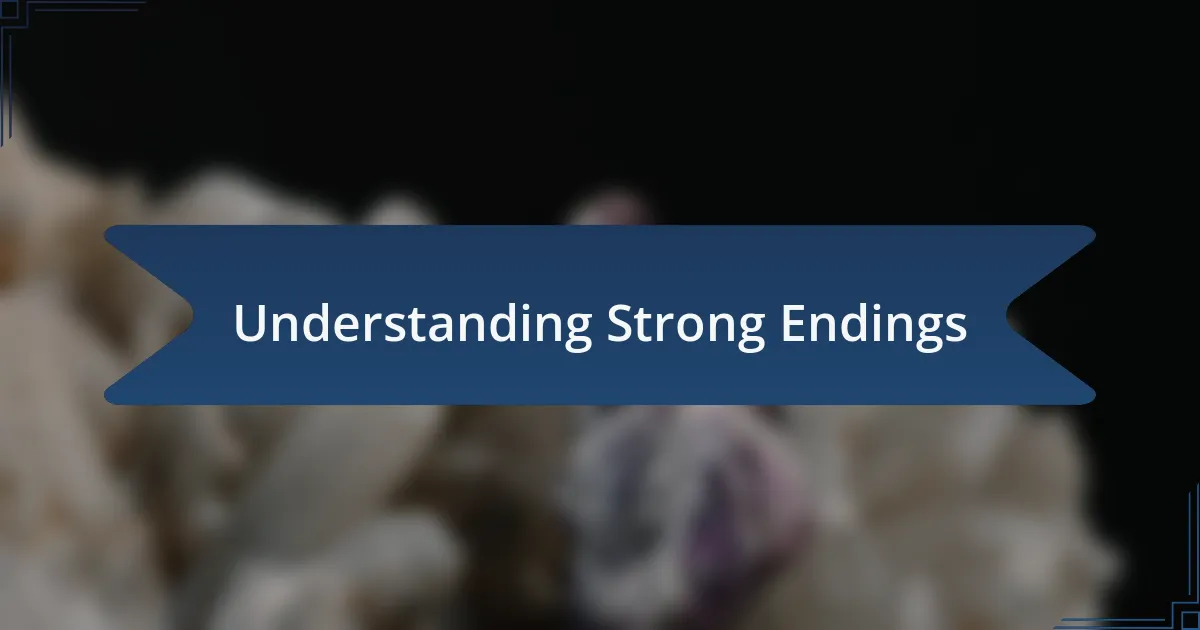
Understanding Strong Endings
Strong endings are the culmination of a story’s journey, a moment when everything falls into place, often leaving readers pondering long after they’ve turned the final page. I remember finishing a gripping Agatha Christie novel, feeling that rush of satisfaction as her carefully planted clues suddenly made perfect sense. Isn’t that feeling of enlightenment what we all strive for in our own writing?
A memorable ending must evoke a powerful emotional response, whether it’s shock, joy, or bittersweet nostalgia. When I penned a short story that ended in an unexpected twist, I held my breath, hoping readers would share in that electrifying moment. How can we craft such an unforgettable experience for our audience? By ensuring that every thread, every character decision, aligns beautifully with the conclusion.
Ultimately, a strong ending ties together the themes and emotions of the narrative, providing closure while inviting reflection. I often think about how readers appreciate when all the pieces fit, almost like a puzzle. What unanswered questions do they take with them after reading? Those lingering thoughts can create a lasting connection, transforming a simple story into a memorable experience.
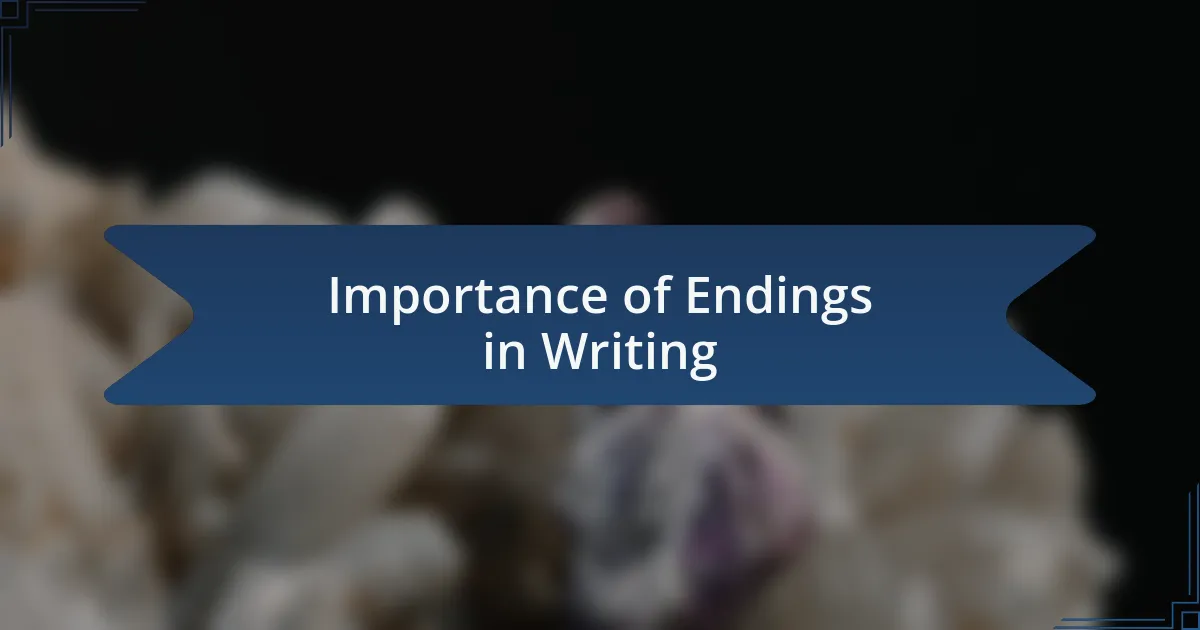
Importance of Endings in Writing
Strong endings serve as the final brushstroke on a painter’s canvas. I vividly recall the thrill of penning the last lines of my mystery short story, where every clue I’d woven throughout the plot finally clicked into place. It was not just about concluding the tale; it was about leaving my readers with a sense of completeness that stayed with them long after they finished reading. Have you ever closed a book and found yourself replaying the ending in your mind? That’s the magic of a well-crafted conclusion.
The emotional impact of an ending can redefine the entire reading experience. There was a time I ended a thriller on a suspenseful note, purposely leaving readers at the edge of their seats. While some may argue that not providing complete closure can frustrate readers, I found that it often ignited discussions and theories among my audience, fostering a deeper engagement. Isn’t it fascinating how an ambiguous ending can spark such vibrant conversations and interpretations?
Moreover, strong endings provide a sense of resolution and satisfaction, but they also echo deeper truths about life and human nature. I’ve noticed that when stories resonate with readers on a personal level, they are often the ones that linger in our hearts. When I reflect on Agatha Christie’s work, her endings not only solved the mystery but often revealed profound insights into the human experience. Don’t we all crave that glimpse of understanding, that connection, when we reach the end of a story?
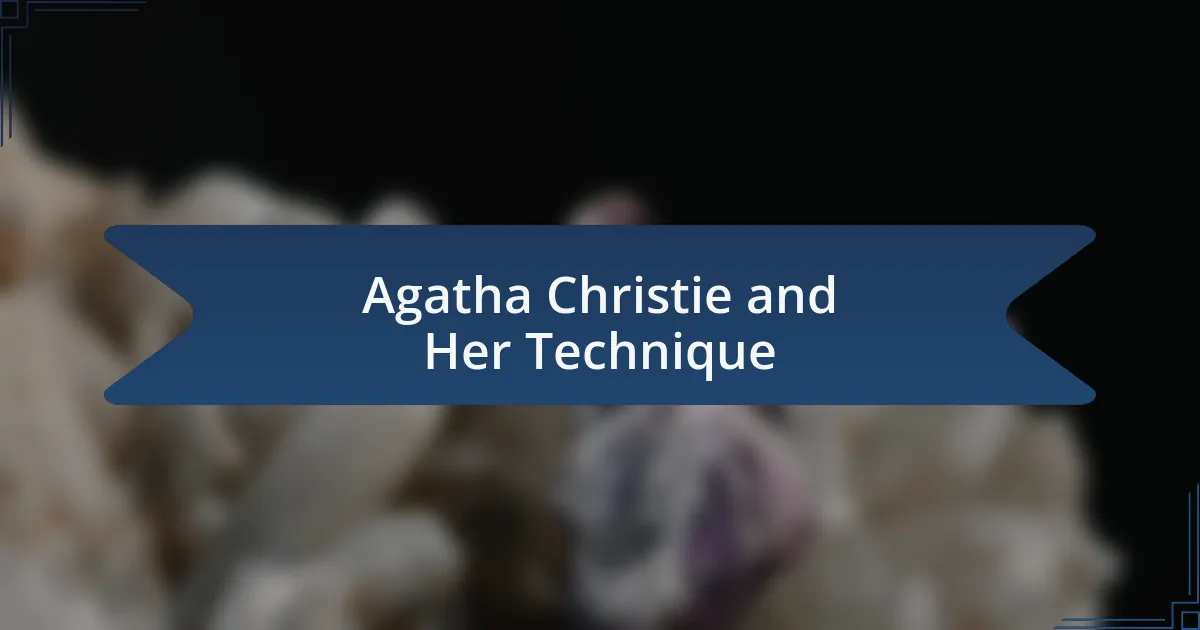
Agatha Christie and Her Technique
Christie had an unparalleled ability to twist the narrative in unexpected ways. Sometimes, upon reaching the final pages of her novels, I felt a mix of relief and astonishment at how she cleverly positioned clues alongside red herrings. Did you ever find yourself re-evaluating every character’s motivation only to discover the simplest one held the key? It’s a brilliant tactic that hooks readers in until the very last moment.
When I reflect on Christie’s technique, I am always struck by her memorable characters and their intricate relationships. In “Murder on the Orient Express,” I remember feeling a whirlwind of emotions as the ending revealed not just the solution to the murder, but also the moral complexities faced by each character involved. How often do you find endings that challenge your perspective on justice and morality? Christie’s finesse lies in crafting not only suspenseful plots but also deeply human dilemmas that resonate long after the book is closed.
Moreover, her skill in pacing the narrative creates a rollercoaster of suspense. I often think about the deliberate manner in which she builds tension, leading me to consider the question: What truly makes a mystery compelling? It’s the anticipation and intrigue, intricately layered and resolved in her iconic finales that leave an indelible mark on our perceptions of storytelling. In my own writing, I strive to emulate that same blend of complexity and resolution, hoping to evoke similar contemplations in my readers.
Lessons from Christie’s Endings
There’s a profound lesson in Christie’s ability to leave readers stunned and reflective at the end of her stories. I remember finishing “And Then There Were None” and feeling the weight of the unexpected finale sink in. It’s a testament to how a strong ending can provoke not just shock but also deep contemplation about human nature and morality. Have you ever pondered how a conclusion can linger in your mind long after the page is turned?
One aspect I find particularly striking is Christie’s commitment to character development, even in her finales. In “The Murder of Roger Ackroyd,” the revelation not only surprises but reshapes our understanding of the narrator himself. This drives home the importance of character arcs; they should lead seamlessly into the ending, enhancing the emotional impact. When I reflect on my own writing, I ask myself: Are my characters evolving in a way that deepens the climax?
Finally, Christie often leaves us with unresolved questions that spark further discussion. Take “Death on the Nile,” where the motives and outcomes prompt introspection about justice. I often wonder how much resolution is too much in storytelling. It’s often in those lingering questions that the richness of a tale is found; they compel us to dive deeper into our own thoughts and feelings, making the ending not just a conclusion but a launching pad for reflection.
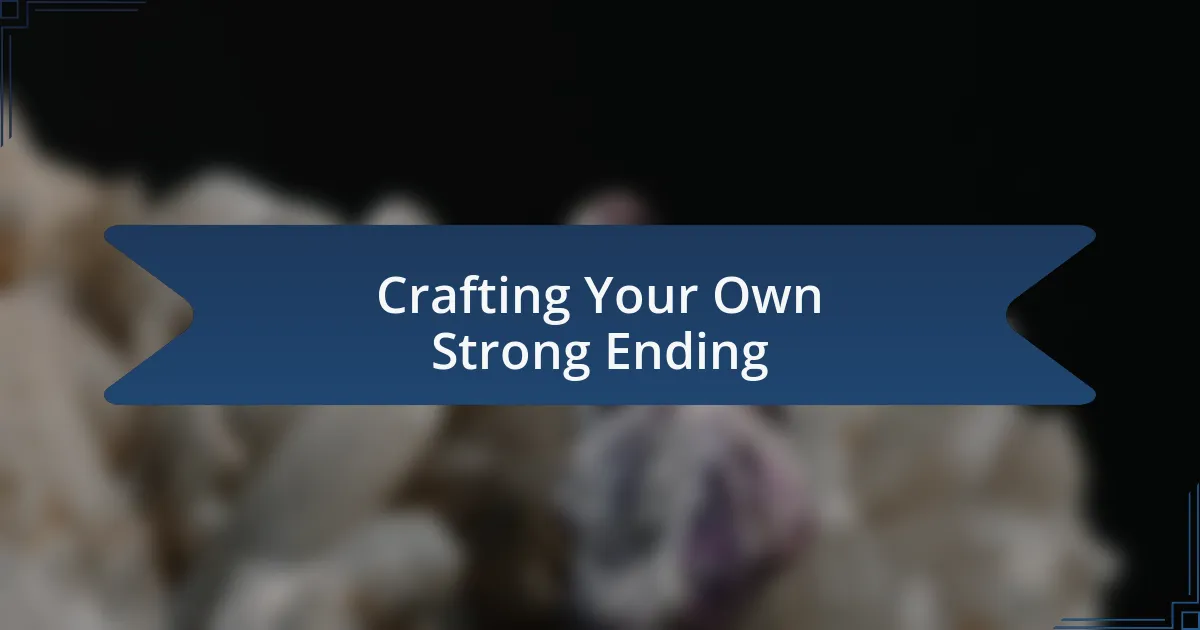
Crafting Your Own Strong Ending
Crafting a strong ending requires an understanding of the journey your characters have taken. I remember struggling with the conclusion of a short story I wrote; it felt flat until I revisited my characters’ growth. By aligning the ending with their individual arcs, I found that the climax not only made sense but resonated with readers on a deeper level. Have you ever felt that shift when the ending finally clicks into place?
It’s fascinating how a strong ending can enhance the emotional landscape of a story. In my experience, leaving readers with a moment of reflection is just as important as delivering the final plot twist. I once ended a piece with a simple yet poignant statement, and the feedback I received highlighted how that last line lingered in readers’ minds, sparking conversations long after they put the story down. What kind of emotional response do you want your ending to evoke?
Consider the power of ambiguity in your conclusions. I’ve played with open-ended endings that invite readers to draw their own conclusions, much like Christie did in “Murder on the Orient Express.” The discussions that followed were truly illuminating. Do you allow room for interpretation, or do you feel the need for closure? Embracing uncertainty can create a lasting impact, prompting readers to engage with your story long after they’ve finished reading.
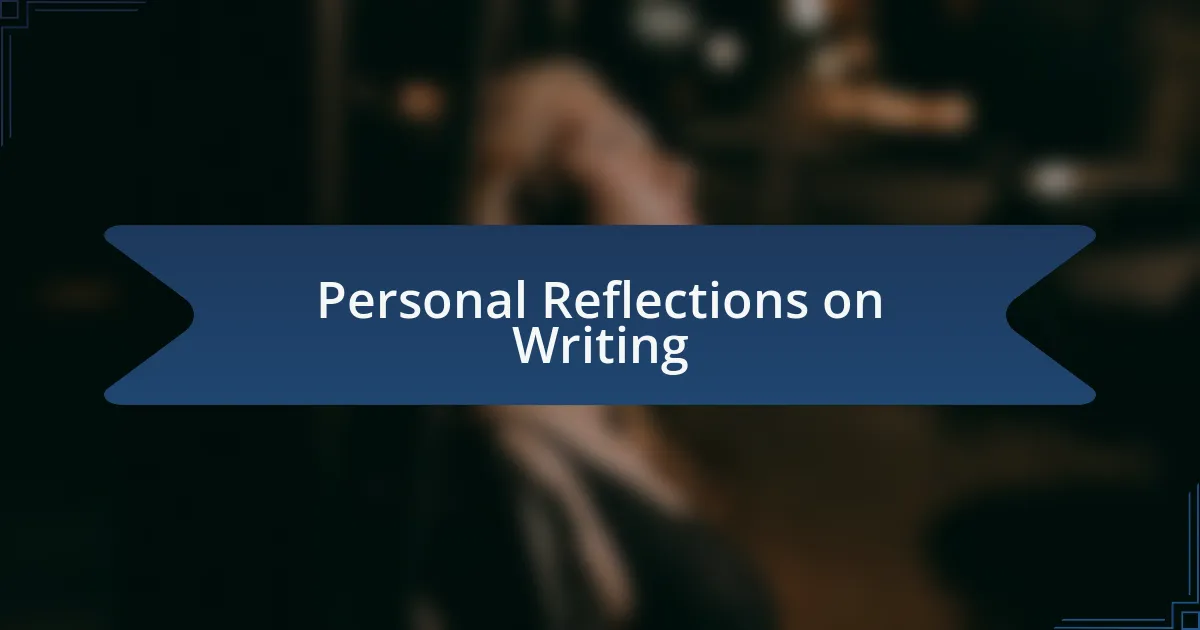
Personal Reflections on Writing
Writing has always been a deeply personal journey for me. I recall a time when I poured my heart into a novel, only to struggle with the conclusion for weeks. Frustration turned to clarity when I realized that what mattered most was not just tying up loose ends but evoking a true emotional response. Have you ever considered what you want your readers to carry away from your story?
In my experience, endings serve as a mirror reflecting the journey of both the characters and the readers. I once rewrote an ending that had become completely disconnected from my protagonist’s experiences, transforming it into a moment that felt authentic and earned. Seeing how that shift resonated with my audience was a thrilling revelation; it made me appreciate the art of crafting a nuanced conclusion that resonates long after the last line.
I find that writing strong endings calls for a mix of intuition and boldness. When I ventured into creating a deliberately ambiguous ending for a short story, I felt a rush of nervous excitement. The feedback from readers was overwhelmingly positive, igniting rich discussions about what could have happened next. I often wonder, how do you balance clarity and ambiguity in your own writing? For me, that’s where the magic happens—right at the intersection of certainty and mystery.